Bill Timmons | |
|---|---|
| White House Director of Legislative Affairs | |
| In office November 5, 1969 –December 31, 1974 | |
| President | Richard Nixon Gerald Ford |
| Preceded by | Barefoot Sanders |
| Succeeded by | Max Friedersdorf |
| Personal details | |
| Born | William Evan Timmons December 27,1930 Chattanooga,Tennessee,U.S. |
| Political party | Republican |
| Education | Georgetown University (BS) |
William Evan Timmons (born December 27,1930) is a retired lobbyist who worked for all Republican presidents since Richard Nixon and for Democratic President Jimmy Carter. John McCain's 2008 presidential campaign asked Timmons to conduct a study in preparation for the presidential transition if McCain won the presidential election. [1]
Timmons is chairman emeritus of lobbying firm Timmons &Company,which he founded in 1975 after he left President Gerald Ford's administration. [2] He was an aide to Senator Alexander Wiley,administrative assistant to Representative Bill Brock,and Assistant for Legislative Affairs to Presidents Richard Nixon and Gerald Ford. [3]
Timmons was born in Chattanooga,Tennessee,and graduated from Baylor School,a military high school,in 1949. He served in the United States Air Force from 1951 to 1955 during the Korean War era. He graduated with a bachelor of science from Georgetown University in 1959. He has three children and nine grandchildren. He is a 33rd-degree Freemason,past officer of the Sons of the American Revolution,and is an active member of the Society of the Cincinnati and various state and county historical organizations. He has served on boards or advisory commissions for Georgetown University's Business School,the International College at the University of South Carolina,Parent's Council of Texas Christian University,and the Center for Strategic and International Studies. [3]
Timmons was the national convention manager for Nixon in 1968 and 1972,Ford in 1976,Reagan in 1980 and 1984. He also was a convention advisor to George H. W. Bush in 1988,and George W. Bush in 2000. Timmons was campaign manager for Rep. Bill Brock in 1962,1964,and 1968. He received the National Young Republican of the Year award in 1965,and was head of congressional relations for the Nixon–Agnew campaign in 1968. In 1980 Timmons was the national political director for the Reagan–Bush campaign.[ dubious ] As Republican National Committee manager,Timmons organized "with extraordinary precision" the 1972 convention to re-elect Nixon,marking a "sea change" in the design and execution of conventions as massive media events,according to Republican convention veteran Bill Greener;"Since then,the move toward planning conventions as TV events continues," he said. [4] During Bob Dole's 1996 presidential campaign,Timmons headed the efforts to plan for a potential presidential transition if Dole were to win. [5]
Career political consultant F. Clifton White said "Timmons had been one of the young recruits who worked with me on the Goldwater campaign,and he already signed up to work for Reagan as political director. I had a great deal of respect for him because he had beaten me in 1968 when I backed Reagan and he was Nixon’s floor manager. Timmons showed me what he was capable of doing that year,and I regarded him as one of the best convention men in the country". [6]
Timmons was the Assistant for Legislative Affairs for Richard Nixon during both of his terms. The Chicago Tribune reported "In the opinion of several White House insiders,the youngest and least publicized of the President's top assistants is probably the one most responsible for Nixon's strategy,tactics and successes in dealing with a Democratic-controlled Congress. He is William Timmons,39." [7] While attending a Washington party during the Nixon presidency,a hostess introduced Timmons as "the man who gets President Nixon's bills passed by Congress." Timmons smiled faintly and replied,"I'm glad I don't get paid on a commission basis." [8] According to the writers of the 1982 publication Who Runs Washington,"Timmons was a loyalist who did all an honest man could for Nixon." [9] Richard O. Jones,writing in 1999,commented that Nixon and Timmons were not very close and that,unlike his predecessor Harlow,Timmons did not "have the ear" of the President. [10] According to Rowland Evans Jr. and Robert D. Novak,neither Nixon nor John Mitchell had full confidence in Timmons' ability to handle Congress. [11] Therefore,in December 1970,Nixon,while praising Timmons in public,appointed Clark MacGregor to oversee Timmons and,more generally,all Congressional liaison,without informing Timmons beforehand. [11]
The Strom Thurmond memo of February 7,1972,recommending deportation of John Lennon,was addressed to Timmons in his role as assistant to President Nixon. [12] The attached file from the Senate Internal Security Subcommittee associated Lennon with the Chicago Seven and noted that "This group has been strong advocates of the program to 'dump Nixon'." [12] Thurmond told Timmons that "many headaches would be avoided if appropriate action were taken." [13] Timmons responded to Thurmond on March 6,1972,indicating that the Immigration and Naturalization Service had served a deportation notice on Lennon. [14] The Nixon administration's failed attempt to deport Lennon before the 1972 US presidential election campaign season [13] [15] was illustrated by these memos,which were published in facsimile in 1975 and 2000. [12] [16] Nixon opposed interpreting Title IX as applying to sports,and Timmons supported him in that view by endorsing the weakest enforcement of Title IX and advising,"[Let's] ban the babes!" [17]
During the Watergate Scandal,after the October 1973 "Saturday night massacre" in which Nixon fired Attorney General Elliot Richardson and Deputy Attorney General William Ruckelshaus and ordered Robert Bork to remove Special Prosecutor Archibald Cox,Nixon asked Timmons to assess the reaction of Congress. After checking,Timmons wrote the first memo to Nixon assessing his likelihood of being impeached;he reported confidentially,"There is not sufficient support in the House to impeach the President,or in the Senate to convict him." [18] As Nixon was struggling to remain in office,in early 1974,Timmons advised him to take advantage of the budget process "when there is strong congressional interest in pork projects. These hometown goodies are most important to many.... This is not the time to save nickels and dimes!" [19] Timmons would eventually advise the president to resign. He believed "it was time for the President to pack it in" and that "a moment of principle had come that would let the President resign with honor –this decision would undermine all future Presidents’authority and thus,in defense of future Presidents,Richard Nixon should,at this moment,resign. (After lunch,Timmons would speak to General Alexander Haig in San Clemente and ask that this advice be brought,in his name,immediately to the President.)" [20]
Timmons continued as Assistant for Legislative Affairs for the Ford administration after Nixon resigned. [21] Ford said "Timmons and I were ideologically in the same spectrum,and I liked him on a very personal basis,always trusted him. Bill’s a pro. He did a great job for Nixon,and under the toughest of circumstances." [18] Timmons,who had the biggest office suite in the West Wing (other than the president's offices),and his team were offered to stay on as long as they liked. [22] In 1974 Ford's advisors thought that Ronald Reagan would never challenge Ford,and Timmons disagreed with them. During the last week of the congressional campaign in Los Angeles,Timmons arranged two secret meetings between Ford and Reagan,and the relationship between the two men became warmer. [23]
On April 19,1978,President Carter reappointed Timmons to the Advisory Committee for Trade Negotiations. [24]
Timmons was a key advisor to Reagan in his campaign against Carter for the 1980 presidential election. His major campaign theme was that Jimmy Carter was "dumb,dangerous,and deceptive," and he was one of two advisors who opposed Reagan engaging in a debate with Carter. [25] Timmons handled congressional relations for the Reagan transition team. With James Baker,on the Legislative Strategy Group,he worked on lobbying for public and congressional support for the president's domestic and economic policies. [26] In 1986 Reagan named Timmons to the US–Japan Advisory Commission. Both countries named members (roughly 12 in total) to study relationships between the two countries and make recommendations. The panel was nicknamed "Wise Men". The Wall Street Journal reported "Three years ago William Timmons was already one of the savviest,best-connected Republican lobbyists that American blue-chip companies could hire. Then President Reagan made him a Wise Man." [27]
After Timmons left the Ford White House,he formed Timmons &Company in 1975. [28] Nicknamed the "Rain Maker" for his aptitude to spur change on Capitol Hill,Timmons has used his clout in a scrupulous fashion. It was reported in 1982 that throughout his years of work in Washington,Timmons had given an honorable name to lobbying. [9]
According to a 1978 Time Magazine article,Timmons was among a small group of lobbyists leading opposition to a 1978 bill that would have required lobbyists "to reveal who pays them,who they represent,and what issues they have sought to shape." Time Magazine reported that the lobbyists were able to "kill" the bill,which stalled in Senator Abraham Ribicoff's Governmental Affairs Committee. [29] In 1979,Chrysler Corporation hired lobbyist Tommy Boggs to influence Democrats,and Timmons,"a man skilled in gaining Republican sympathy for corporate causes," in their work to secure loan guarantees. [30] It has been opined that "Chrysler ought to name a couple of new models after [Tommy] Boggs and Timmons." [9]
In 1983-1986,Timmons lobbied for Bophuthatswana. [31] According to Paul Volcker's Independent Inquiry Commission report commission by the United Nations,in 1992–1995 Timmons worked with entrepreneur Samir Vincent and public relations consultant John Venners in attempts to get an oil deal with Iraq,which was under UN sanctions at the time. [32] [33] Timmons and seven employees of Timmons and Company were listed as lobbyists for Bristol-Myers Squibb with "revolving door" connections to government in 2001 by Public Citizen; [34] they listed the same eight in 2002 and 2003. [35]
In 2008,the Obama campaign,which itself had an unpaid advisor from Timmons &Co. (later hired as an employee), [36] referred to Timmons as "one of Washington’s most famous and powerful lobbyists" when Timmons was tapped for planning help by the McCain campaign. [37] Time Magazine reported that Timmons's lobbying registrations "include work on a number of issues that have become flashpoints in the presidential campaign. He has registered to work on bills that deal with the regulations of troubled mortgage lenders Freddie Mac and Fannie Mae,a bill to provide farm subsidies and bills that regulate domestic oil-drilling." [1]

The 1968 United States presidential election was the 46th quadrennial presidential election, held on Tuesday, November 5, 1968. The Republican nominee, former vice president Richard Nixon, defeated both the Democratic nominee, incumbent vice president Hubert Humphrey, and the American Independent Party nominee, former Alabama governor George Wallace. This was the last election until 1988 in which the incumbent president was not on the ballot. This is the most recent election where a third-party candidate won an electoral vote.
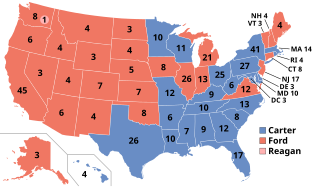
The 1976 United States presidential election was the 48th quadrennial presidential election, held on Tuesday, November 2, 1976. Democrat Jimmy Carter, former Governor of Georgia, defeated incumbent Republican president Gerald Ford in a narrow victory. This was the first presidential election since 1932 in which the incumbent was defeated, as well as the only Democratic victory of the six presidential elections between 1968 and 1988.

James Strom Thurmond Sr. was an American politician who represented South Carolina in the United States Senate from 1954 to 2003. Before his 48 years as a senator, he served as the 103rd governor of South Carolina from 1947 to 1951. Thurmond was a member of the Democratic Party until 1964 when he joined the Republican Party for the remainder of his legislative career. He also ran for president in 1948 as the Dixiecrat candidate, receiving over a million votes and winning four states.
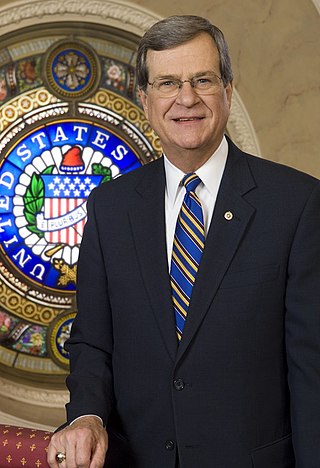
Chester Trent Lott Sr. is an American lobbyist, lawyer, author, and politician who represented Mississippi in the United States House of Representatives from 1973 to 1989 and in the United States Senate from 1989 to 2007. Lott served in numerous leadership positions in both chambers of Congress as one of the first of a wave of Republicans winning seats in Southern states that had been solidly Democratic. Later in his career, he served twice as Senate Majority Leader, and also, alternately, Senate Minority Leader. In 2003, he stepped down from the position after controversy due to his praising of Senator Strom Thurmond's 1948 segregationist Dixiecrat presidential bid.
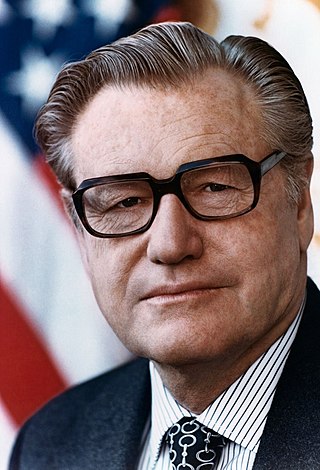
The Rockefeller Republicans were members of the United States Republican Party (GOP) in the 1930s–1970s who held moderate-to-liberal views on domestic issues, similar to those of Nelson Rockefeller, Governor of New York (1959–1973) and Vice President of the U.S. (1974–1977). Rockefeller Republicans were most common in the Northeast and the industrial Midwestern states, while they were rare in the South and the West.

In American politics, the Southern strategy was a Republican Party electoral strategy to increase political support among white voters in the South by appealing to racism against African Americans. As the civil rights movement and dismantling of Jim Crow laws in the 1950s and 1960s visibly deepened existing racial tensions in much of the Southern United States, Republican politicians such as presidential candidate Richard Nixon and Senator Barry Goldwater developed strategies that successfully contributed to the political realignment of many white, conservative voters in the South who had traditionally supported the Democratic Party. It also helped to push the Republican Party much more to the right relative to the 1950s. By winning all of the South a presidential candidate could obtain the presidency with minimal support elsewhere.
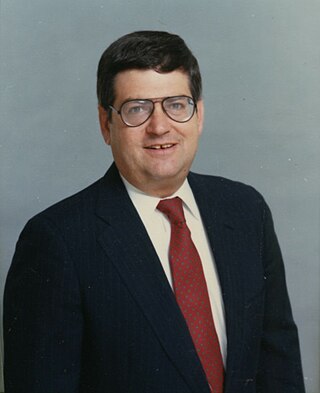
Kenneth Marc Duberstein was an American lobbyist who served as U.S. president Ronald Reagan's White House Chief of Staff from 1988 to 1989.

Gerald Ford's tenure as the 38th president of the United States began on August 9, 1974, upon the resignation of president Richard Nixon, and ended on January 20, 1977. Ford, a Republican from Michigan, had been appointed vice president since December 6, 1973, following the resignation of Spiro Agnew from that office. Ford was the only person to serve as president without being elected to either the presidency or the vice presidency. His presidency ended following his narrow defeat in the 1976 presidential election to Democrat Jimmy Carter, after a period of 895 days in office.
In politics, opposition research is the practice of collecting information on a political opponent or other adversary that can be used to discredit or otherwise weaken them. The information can include biographical, legal, criminal, medical, educational, or financial history or activities, as well as prior media coverage, or the voting record of a politician. Opposition research can also entail using "trackers" to follow an individual and record their activities or political speeches.
John Patrick Sears was an American attorney, and a Republican political strategist. He served as Deputy Counsel to President Richard M. Nixon from 1969–70, and assisted both Nixon and Ronald Reagan in their presidential campaigns.
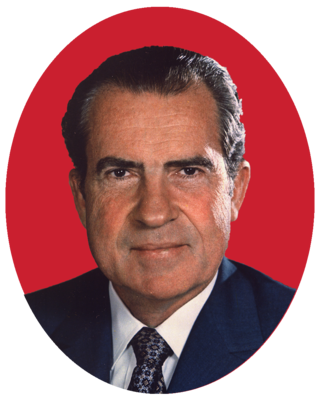
The 1972 Republican National Convention was held from August 21 to August 23, 1972, at the Miami Beach Convention Center in Miami Beach, Florida. It nominated President Richard M. Nixon and Vice President Spiro T. Agnew for reelection. The convention was chaired by House minority leader and future Nixon successor Gerald Ford of Michigan. It was the fifth time that Nixon had been nominated on the Republican ticket for vice president or president. Nixon's five appearances on his party's ticket matched the major-party American standard of Franklin D. Roosevelt, a Democrat who had been nominated for vice president once and president four times.

The United States Secret Service uses code names for U.S. presidents, first ladies, and other prominent persons and locations. The use of such names was originally for security purposes and dates to a time when sensitive electronic communications were not routinely encrypted; today, the names simply serve for purposes of brevity, clarity, and tradition. The Secret Service does not choose these names, however. The White House Communications Agency maintains a list that candidates choose from, often choosing ones that resonate with them personally.
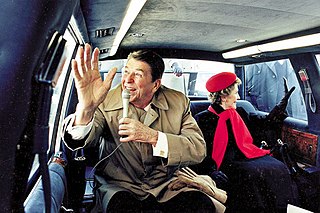
This is the electoral history of Ronald Reagan. Reagan, a Republican, served as the 40th president of the United States (1981–1989) and earlier as the 33rd governor of California (1967–1975). At 69 years, 349 days of age at the time of his first inauguration, Reagan was the oldest person to assume the presidency in the nation's history, until Donald Trump was inaugurated in 2017 at the age of 70 years, 220 days. In 1984, Reagan won re-election at the age of 73 years, 274 days, and was the oldest person to win a US presidential election until Joe Biden won the 2020 United States presidential election at the age of 77 years, 349 days.

Charles R. Black Jr. is an American lobbyist and businessman, who is the Founding Chairman of Prime Policy Group, a public affairs firm which is now a subsidiary of Burson Cohn & Wolfe. Prime Policy Group was formed with the merger of Martin B. Gold's Gold & Liebengood with the Washington, DC-based lobbying firm he co-founded—BMSK—with Paul Manafort, Roger J. Stone, and Peter G. Kelly. In 2010, Black was inducted into the American Association of Political Consultants (AAPC) Hall of Fame.
Timmons & Company is an American lobbying firm based in Washington, D.C. After William Timmons left the Ford White House in 1975, he founded this company along with Tom Korologos, who had reported to Timmons as Richard Nixon's White House legislative liaison.
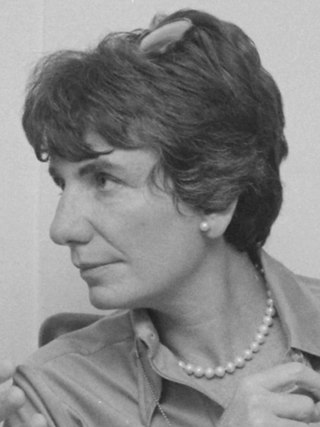
Anne Levy Wexler was an influential American Democratic political consultant, public policy advisor, and later the first woman to head a leading lobbying firm in Washington, D.C.
Ronald Reagan announced his candidacy for President of the United States on November 20, 1975. He won primaries in several states, but eventually lost the nomination to incumbent president Gerald Ford at the 1976 Republican National Convention.
Strom Thurmond served in the United States Senate from 1956 to 2003. He was a supporter of the presidencies of Richard Nixon, Gerald Ford, Ronald Reagan, George H. W. Bush, and George W. Bush.
{{cite magazine}}: Cite magazine requires |magazine= (help){{cite magazine}}: Cite magazine requires |magazine= (help)Who Runs Washington.
...when Nixon was facing reelection, and when the 'clever Beatle' was living in New York and joining up with the antiwar movement. The Nixon administration learned that he and some radical friends were talking about organizing a national concert tour to coincide with the 1972 election campaign, a tour that would combine rock music and radical politics, during which Lennon would urge young people to register to vote, and vote against the war, which meant, of course, against Nixon. The administration learned about Lennon's idea from an unlikely source: Senator Strom Thurmond. Early in 1972 he sent a secret memo to John Mitchell and the White House [Timmons] reporting on Lennon's plans and suggesting that deportation 'would be a strategy counter-measure'.
The assistant to the President [Timmons] wrote back in March and assured Senator Thurmond that the government had issued direct orders to rescind John's visa.
The veteran South Carolina senator Strom Thurmond sent a confidential memo to the White House warning of Lennon's political leanings and adding: "If Lennon's visa is terminated it would be a strategy counter-measure." A few weeks later a reply came from William E Timmons, a presidential aide: "I thought you would be interested in learning that the Immigration and Naturalization Service has served notice on him that he is to leave this country no later than March 15."
A memo dated February 4, 1972, was forwarded to former Attorney General John Mitchell and Bill Timmons of the White House by Sen. Strom Thurmond, describing Lennon as a threat to the US government and the reelection campaign of Richard Nixon because of Lennon's affiliations with members of the Radical Left, which was then trying to stimulate voter registration of 18-year-olds. The presidential election in 1972 was the first one in which 18-year-olds could vote, making 18- to 20-year-olds a very important constituency. I also uncovered a memo in which Marks is advised by Washington to deny all applications, to revoke the Lennons' voluntary departure privilege, and to schedule the deportation hearing for March 16, 1972—strong evidence of prejudgment of the case for political purposes.
William Timmons President-Ford.
{{cite news}}: Missing or empty |title= (help)But in these five instances, and others like them, the force that proved decisive in blocking passage this year arose out of a dramatic new development in Washington: the startling increase in the influence of special-interest lobbyists. ... The lobbyists have grown so able and strong that last week a mere handful of them was able to kill another bill, one of particular significance to them. It would have required the lobbyists to reveal who pays them, who they represent and what issues they have sought to shape. The bill, which finally passed the House in April, came up last week before Senator Abraham Ribicoff's Governmental Affairs Committee—and was promptly consigned to either imminent death or limbo by the lobbyists. Leading the assault against it were such diverse persuaders as William Timmons, the former Capitol Hill liaison man for the Nixon and Ford Administrations, Freelancers Maurice Rosenblatt and William Bonsib, and Diane Rennert of the Association of American Publishers. In a multiple assault, they first threw their weight behind a much milder version of the bill, which was substituted for Ribicoff's stiff version. Despite telephone calls from the President, even the soft bill was then stalled indefinitely in committee, since no sponsor was willing to lead a drive to get it approved by the full Senate. Declared triumphant Lobbyist Rennert: 'It's dead, dead, dead'.